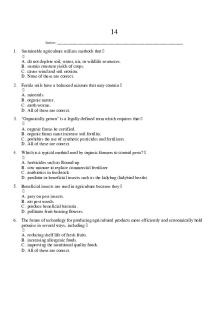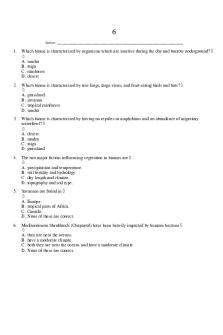Course Intro PDF

| Title | Course Intro |
|---|---|
| Author | CX Su |
| Course | Computer Networks and Applications |
| Institution | University of New South Wales |
| Pages | 26 |
| File Size | 1.4 MB |
| File Type | |
| Total Downloads | 98 |
| Total Views | 151 |
Summary
Course-intro...
Description
COMP3331/9331
Computer Networks and Applications COMP 3331/COMP 9331 2020 T3 LIC: Salil Kanhere
Course Outline & Logistics
1
COMP3331/9331
Today’s Agenda Course (non-technical) details • Logistics: How we will roll • What is this course about? • Introduction to Computer Networks (course content begins) •
2
COMP3331/9331
Course Staff • Lecturer-in-Charge: Salil Kanhere • Course Admin: Ayda Valinezhad Orang • Teams Live Event Moderator: Guntur Dharma Putra • Tutors: • Adam Yi • Ayda Valinezhad Orang • Gina Chen • Guntur Dharma Putra • Joel Smith • Mohammad Yaghoubzadehfard • Nipuna Shanthidewa • Pooja Gupta • Sahil Punchhi • Sidra Malik • Wei Song
3
COMP3331/9331
Resources •
https://webcms3.cse.unsw.edu.au/COMP3331/20T3/
•
Everything is posted on the course website • • • • • • • • • • •
Very
Course Outline (PLEASE READ THIS THOROUGHLY) important Lecture Notes Video Recordings Lab Schedules, Allocations and Locations Assignment and Lab Exercises Homework Problems Exam Information Consultation hours Announcement: Your responsibility to check the announcement forum on regular basis for important updates/changes to schedule, etc. Your active participation and interaction is crucial to ensure that all of us get the most out of this course Note: You will need to login using your zID/zPass 4
COMP3331/9331
Me •
Research • Internet of Things, Cyber Physical Systems, Pervasive
Computing, Cybersecurity, Blockchain, Data Science •
Teaching • UG: COMP{1911, 1917, 1921, 1521, 3331, 6733} • PG: COMP{9331, 9332, 9333, 9337}
•
Admin • Postgraduate Research Coordinator
•
Life: • Science/Technology, Metal/Rock, Travel, Movies, Lifting
heavy things, …
5
COMP3331/9331
You Mix of UG (mostly 2nd/3rd year) and PG (mostly 1st year) • Mostly CSE students but a few from other Engineering schools (Mech, EET) and Faculties (Business, Science, Law) • Assumed Knowledge: •
• COMP1927/COMP2521/MTRN3500 • Good understanding of data structures and algorithms and basic
probability theory • Proficient in one of the following programming languages: C, Java or Python • We DO NOT assume that you know anything about computer networks 6
COMP3331/9331
Course Material •
• • •
Computer Networking: A Top Down Approach, Jim Kurose, Keith Ross, Addison-Wesley (Pearson), 7th Edition, 2016 (6th Edition will suffice for most of the part). Lecture Notes (on WebCMS) Links/articles on additional material Reference Books: Computer Networks: A Systems Approach, Larry Peterson and Bruce Davie, Morgan Kaufmann, Fourth Edition, 2007. • Unix Network Programming Volume 1 - Networking APIs: Sockets and XTI, W. Richard Stevens, Prentice Hall, Second Edition, 1998 (Third edition also available) • Java Network Programming, E. R. Harold, O'Reilly, Third Edition, 2004. •
•
Links to programming help 7
COMP3331/9331
Course Aims • To gain in-depth introduction to a wide range of topics in the
field of computer networks, including the Internet • To obtain hands-on understanding of networking protocols • To gain skills in network programming, designing and
implementing network protocols, performance and problem solving
evaluating
network
• To build necessary foundational knowledge required in more
advanced networking courses 8
COMP3331/9331
Teaching/Learning Strategies Lectures (9 weeks, 4-hr per week) • Labs •
• Hands-on learning
•
Programming Assignment • Network programming and protocol design
•
Weekly Homework (Self-assessed) • Problem solving skills
9
COMP3331/9331
Lectures • Online via Teams Live Meeting • Link to each lecture event posted on the Lectures Page • Same link should give you access to the recording • There is a 20-30 second delay from when I speak to when you hear me • Weeks 1-5 and 7-10 (2 x 2-hour lectures x 9 weeks) • We will focus on most important concepts and supplement with • Problem solving exercises • Discussions • News • Certain material will be left for self study • These will be indicated on the lecture notes • We will use Zeetings quizzes a few times every lecture • For you to reinforce concepts • For me to get an indication of your understanding
10
COMP3331/9331
Quiz: The most useful superpower for a UNSW student would be:
A
B
Invisibility
Flight
C Telepathy
D Time Travel
E: Some other power?? Go to: www.zeetings.com/salil
11
COMP3331/9331
Labs • 2-hour lab sessions starting Week 2 (Weeks 2-5, 7-10) • All labs will be held online using Teams/Zoom – meeting links
will be posted on course webpage • Hands-on experiments related to concepts covered in lectures • Wireshark packet sniffer, ns-2 network simulator, other network measurement tools, socket programming practice
• 8 lab sessions: • 6 Lab Exercises (guided by tutors) – 5 best performing labs out of 6 will be used for assessment – Lab report to be submitted (no demos) – Highly encouraged to attempt lab tasks before attending labs • 2 Problem-based learning sessions (Tutorials in Week 5 & 10) – No marks – Serves as preparation for exams 12
COMP3331/9331
Online Labs: VLAB • Access CSE lab environment on your own machine remotely • Uses VNC • Recommended client: TigerVNC (https://tigervnc.org) • Details: https://taggi.cse.unsw.edu.au/FAQ/VLAB_-
_The_technical_details/ • UNSW VPN: https://www.myit.unsw.edu.au/services/students/remote-accessvpn • China Students Access Network: https://www.myit.unsw.edu.au/services/students/china-studentsaccess-network • You will need to know basic command line Linux commands: http://www.unixguide.net/linux/linuxshortcuts.shtml
13
COMP3331/9331
Getting help • Use online discussion forums • Fellow students benefit from your questions • Fellow students can answer your questions • Develop a community • Use [email protected] for communication with the
course authorities. DO NOT email LiC/admin on personal email address • Consultation hours • LiC for lecture-related help – 1.5 hours each week • Distinct consultation slots for programming help -
C/Python/Java • Tutors • Establish an agreeable mode of communicating with them
14
COMP3331/9331
Code of Conduct •
CSE offers an inclusive learning environment for all students. In anything connected to UNSW, including social media, these things are student misconduct and will not be tolerated: • racist/sexist/offensive language or images • sexually inappropriate behaviour • bullying, harassing or aggressive behaviour • invasion of privacy
•
Show respect to your fellow students and course staff 15
COMP3331/9331
Plagiarism What is plagiarism? Presenting the (thoughts or) work of another as your own. Cheating of any kind constitutes academic misconduct and carries a range of penalties. Please read course intro for details. Examples of inappropriate conduct: • groupwork on assignments/labs (discussion OK) • allowing another student to copy your work • getting your hacker cousin to code for you • purchasing a solution to the assignment
Remember: You are only cheating yourself and chances are you will get caught! 16
COMP3331/9331
Plagiarism • • • • • • •
Labs, assignments, exams must be entirely your own work You can not work on assignment as a pair (or group) Plagiarism will be checked for and penalized Plagiarism may result in suspension from UNSW Scholarship students may lose scholarship International students may lose visa Supplying your work to any another person may result in loss of all your marks for the lab/assignment 17
COMP3331/9331
Assessment • Hands-on – 40% • Labs 20% • Assignment 20% • Assignment released in Week 4, due in Week 10 • Implement a networked application • We assume you are proficient in one of C/Java/Python • Concepts and theory – 60% • Mid-term test (20%) • In Week 7 (includes material from Week 1 to Week 5) • Open-book online exam • Final Exam (40%) • End of semester • Open-book online exam • Hurdle – must score at least 40% to pass the course 18
COMP3331/9331
Assessment NOTE: To pass the course, a student MUST receive at least 40% marks on the final exam lab = marks for lab exercises (20 marks) assign = mark for the programming assignment (20 marks) midTerm = mark for the mid-semester exam (20 marks) scaledfinalExam = scaled mark for the final exam (out of 40 marks) mark = lab + assign + midTerm + scaledfinalExam Grade: = HD|DN|CR|PS if mark >= 50 && scaledfinalExam >= 16 = FL if mark < 50 || scaledfinalExam < 16
NOTE: If you cannot clear the final exam hurdle (after scaling), reported grade would be ‘UF’ with maximum marks reported as 40
19
COMP3331/9331
How to do well in this course • • • • • •
Keep up with and absorb all the content A critical/analytical viewpoint will help Solve all homework/practice problems Do the lab exercises yourself Do the assignment yourself Practice, practice, practice
20
COMP3331/9331
Fully Online Delivery • We all need to work together • Course Staff • Regular communication about upcoming deadlines (weekly notices) • Timely response to questions • Timely feedback on assessments • Students • Be aware of deadlines/deliverables and how to access resources • Links for lectures/labs/consults/exams • VLAB for labs and assignments
• Check course notices regularly • Ask questions through the appropriate channels (online forum is preferred) • Participate in lectures and fourm (community building)
21
COMP3331/9331
What is this course about ? • Introductory course in computer network • Learn principles and practice of computer networking • We use the Internet as a vehicle to understand the core concepts of networking
22
COMP3331/9331
What is this course about ? 1.
To learn how the Internet works • Internet is a complex global infrastructure • What are the organising principles behind the Internet? • What really happens when you “browse the Web”? • What are TCP/IP, DNS, HTTP, NAT, VPNs,
802.11,…. anyway?
23
COMP3331/9331
What is this course about ? 1.
To learn how the Internet works • Internet is a complex global infrastructure • What are the organising principles behind the Internet? • What really happens when you “browse the Web”? • What are TCP/IP, DNS, HTTP, NAT, VPNs,
802.11,…. anyway? 2.
To learn the fundamentals of computer networks • What issue you need to take into consideration to make
a computer network work well? • What design strategies have proven valuable? • How do we evaluate network performance? 24
COMP3331/9331
Where do I go from here? • COMP 9332: Network Routing and Switching • COMP 9334: System Capacity and Planning • COMP 3441/9441: Security Engineering • COMP 4336/9336: Mobile Data Networking • COMP 4337/9337: Securing Wireless Networks • COMP6733: Internet of Things Design Studio • Thesis Projects • Research Degree (MPhil, PhD)
25
COMP3331/9331
26...
Similar Free PDFs

Course Intro
- 26 Pages

Intro to Psych Course Notes
- 44 Pages

L1-course intro - Lecture notes 1
- 26 Pages

Intro
- 3 Pages

Intro
- 19 Pages

Intro
- 2 Pages

Intro
- 2 Pages
Popular Institutions
- Tinajero National High School - Annex
- Politeknik Caltex Riau
- Yokohama City University
- SGT University
- University of Al-Qadisiyah
- Divine Word College of Vigan
- Techniek College Rotterdam
- Universidade de Santiago
- Universiti Teknologi MARA Cawangan Johor Kampus Pasir Gudang
- Poltekkes Kemenkes Yogyakarta
- Baguio City National High School
- Colegio san marcos
- preparatoria uno
- Centro de Bachillerato Tecnológico Industrial y de Servicios No. 107
- Dalian Maritime University
- Quang Trung Secondary School
- Colegio Tecnológico en Informática
- Corporación Regional de Educación Superior
- Grupo CEDVA
- Dar Al Uloom University
- Centro de Estudios Preuniversitarios de la Universidad Nacional de Ingeniería
- 上智大学
- Aakash International School, Nuna Majara
- San Felipe Neri Catholic School
- Kang Chiao International School - New Taipei City
- Misamis Occidental National High School
- Institución Educativa Escuela Normal Juan Ladrilleros
- Kolehiyo ng Pantukan
- Batanes State College
- Instituto Continental
- Sekolah Menengah Kejuruan Kesehatan Kaltara (Tarakan)
- Colegio de La Inmaculada Concepcion - Cebu








